Mystērion Finds Success
AMY PALMER Asst. News Editor
Like many students at Boston College, Dennis Wieboldt, MCAS ’22, took Perspectives on Western Culture—a six-credit philosophy and theology course—his freshman year.
The class became the stepping stone for Wieboldt’s studies in theology, he said, motivating him to take more classes, pursue the major, and eventually launch BC’s first undergraduate theology journal, Mystērion.
“I was trying to think more about different ways for students to engage in conversations like that outside of
just the classroom,” Wieboldt, founder and editor-in-chief, said. “So one idea that I pitched to the director of undergraduate studies, Professor Cooley, … [was] about maybe starting a journal for the theology department.”
Mystērion’s inaugural issue was published on Aug. 31, and featured six articles from undergraduates at BC, Princeton University, and Fordham University.
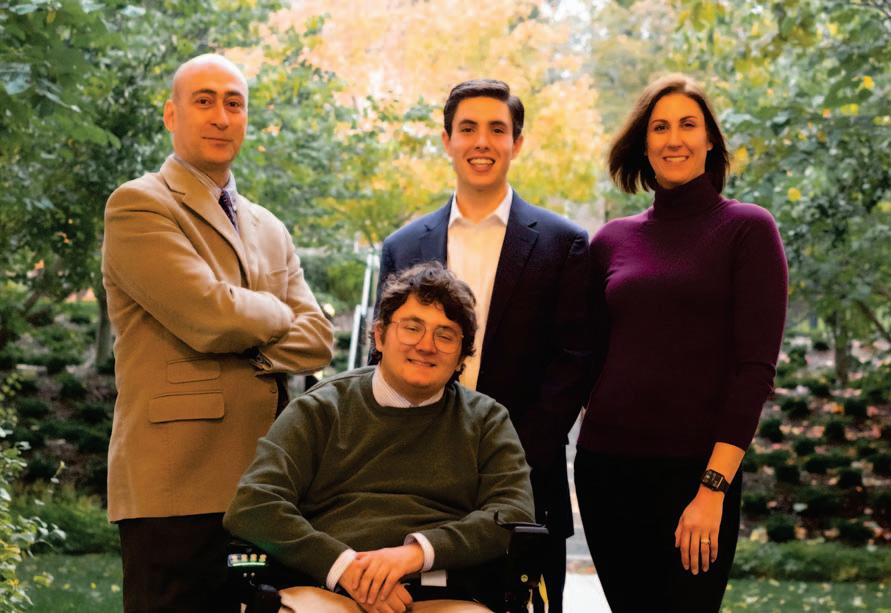
Wieboldt said the editorial board was pleasantly surprised by the volume of submissions for the first issue.
“We got a good number of submissions for our first edition, which was something that we were pleas-
antly surprised by,” Wieboldt said.
Associate Editor Conor McCormick came up with the name Mystērion, which means hidden things in Greek, Wieboldt said.
“It’s supposed to refer substantively to the idea that there are hidden things that we can explore through theological inquiry, and then also it’s supposed to honor Father Michael Himes,” Wieboldt said.
Himes, a former theology professor at BC, frequently referred to God in his lectures as a “Sovereign Mystery.” Mystērion draws its name from these two things.
METRO
Tatte opens a new store in Newton Centre and serves up lattes and pastries to Newtonians.
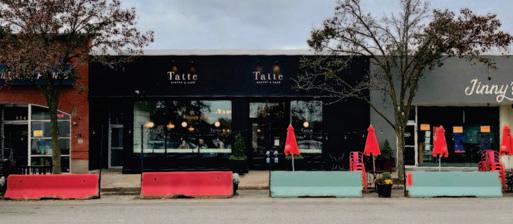
BC Endowment at All-Time High
HALEY HOCKIN Special Projects Editor ERIN SHANNON Copy Chief
In the 1970s, when Boston College’s endowment hovered around $5 million, it would have been difficult to predict the powerhouse that BC’s endowment would eventually become. This past fiscal year, the endowment reached its all-time high: $3.8 billion.
An endowment is a group of donations given to a school to support its educational mission. Schools then invest this money to further develop the endowment, ensuring future financial stability.
The main goal of an endowment is to provide a buffer against economic fluctuations, according to Thomas Parker, senior associate emeritus at the Institute for Higher Education Policy.
“I have to say that one of the primary functions of an endowment is to provide a financial buffer during bad economic times,” Parker said. “And that’s been the most important factor in most of the outstanding universities in America, in their ability to survive and to be outstanding.”
Endowments typically have strict rules on what money can be spent, with most schools never touching the principal balance, but only the interest that builds each year. Most modern endowments invest in a variety of assets, like stocks, bonds, and real estate, among others.
Timeline of BC’s Endowment
In 1970, BC students went on strike. The University had announced it was raising tuition by $500—a sizable amount at the time—and students were outraged. One cause of this tuition raise was the University’s precarious financial situation.
“It was ‘significant deficits’ in fiscal years 1969, 1970, 1971, and 1972 which brought the University to the brink of financial ruin,” an administrator told The Heights in 1973.
As BC struggled to overcome these budget deficits, it faced another problem: a comparatively small endowment. A Heights article from 1970 reported that while Harvard University’s endowment was over $1 billion, BC’s was just $5 million.
In 1980, BC decided to implement a new investment strategy that would focus on the future instead of immediate operating costs. John Smith, financial vice president and treasurer at the time, said that BC would reinvest most of the endowment’s income and buy growth stocks. He
hoped this method would average an endowment growth of 15 percent per year, not including gifts.
“Smith believes an endowment fund should provide academic enrichment through the establishment of chairs, provide scholarships for needy people, benefit the physical plant, assist the school in times of financial need, and enhance the whole balance sheet,” reads a Heights article from December of that year. “But, Smith says BC’s $8 million endowment fund is ‘too’ small to perform adequately.”
BC no longer discloses its investment portfolio, but a Heights article from 1980 showed the shares BC had in oil companies at the time: 3,200 in Exxon Corporation and 1,200 in Royal Dutch Petroleum.
BC’s endowment experienced bumps in subsequent years—such as a dip in the endowment following the stock market crash known as Black Monday in 1987—but by 1995, BC’s endowment had increased to $447 million, ranking first among the nation’s Jesuit colleges. Passing the billion dollar mark in 2000, BC’s endowment had doubled in value since early 1995.
Recent Developments
In the past fiscal year, BC’s endowment jumped by around $1.2 billion, bringing the endowment’s total to $3.8 billion. This 46 percent increase reflects a year of broad endowment growth for colleges nationwide, though BC performed particularly well, with gains 19 percent above the median.
This increase is significant compared to recent growth—the endowment was $2.2 billion in 2016, $2.4 billion in 2017, $2.6 billion in 2018, $2.5 billion in 2019, $2.6 billion in 2020, and now, $3.8 billion.
“This year’s increase was attributable to a strong market and the excellent leadership of the Investment and Endowment Committee of the Boston College Board of Trustees and BC’s Chief Investment Officer John Zona,” wrote Senior Associate Director of Communications Ed Hayward in an email to The Heights
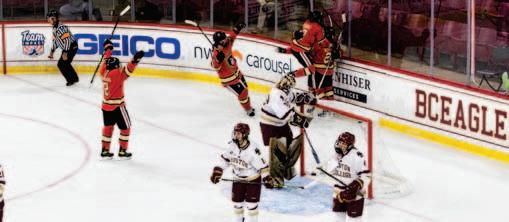
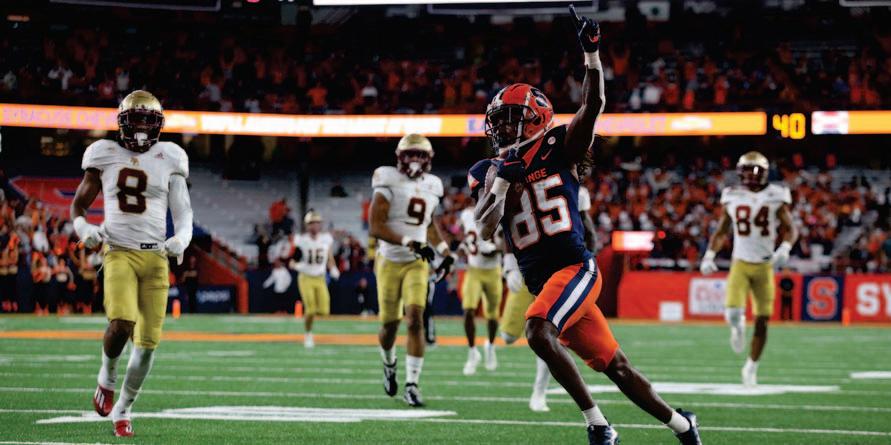

A BC Perspective
Peter Ireland, professor in the economics department at BC, said that because the main source of funds for endowments is philanthropy, endowment management is done with the goal of managing lumpy payments to ensure that the expenses paid out of the endowment are smooth.
Chestnut
S PORTS INSIDE THIS ISSUE MAGAZINE... ARTS......... OPINIONS..... NEWS........... METRO.......... SPORTS....... A6 A7 A8 A2 A3 A4 Eagles Drop to . 500
INDEX
AP PHOTO BC Football fell to Syracuse, marking fourth straight loss. See
A3 SPORTS Northeastern breaks BC women’s hockey’sv winning streak with two straight wins in a homeand-home series. A4 Monday, November 1, 2021 www.bcheights.com
Hill, Mass.
See Theology, A2
Vol. CIII, No. 17 © 2021, The Heights, Inc. www.bcheights.com Estalished 1919 COURTESY OF
Football, A4
See
A2
Endowment,
NICOLE WEI / FOR THE HEIGHTS
2 3
A Look Inside BC’s $3.8 Billion Endowment
“You don’t want the fitness center to be open one year and have to close down partially the next,” Ireland said.
He cited three reasons why philanthropic donations to BC’s endowment fund are inconsistent.
Firstly, major donors to BC, such as the Lynch family or the Fish family, do estate planning periodically, so they normally donate to the University at those times.


Additionally, while the University runs capital campaigns every five to seven years that bring money into the endowment, it is limited in how often they can run such campaigns, Ireland said.
“You can’t go to donors every year and say, ‘It’s really important this time,’” he said.
Lastly, for the vast majority of donors, their willingness to donate to the endowment annually normally depends on the economy and the stock market.
“In the December of a great year where you got a big raise and the market [has] gone up, you’re happy to give money,” Ireland said. “In years when the market goes down and you’re worried about maybe even losing your job, you’d like to give more money but you’re just not going to.”
Implications of the Increase
Ireland cited BC’s large endowment growth this year to a mixture of wellplaced investments and the strength of the stock market.
“Even if it was simply stocks, it was a great year for the BC endowment,” he said.



While the pandemic brought challenges to the economy, Ireland said this past year’s growth was a silver lining. He also said, however, that this stark increase is not reflective of future endowment growth for BC.
“What managers of the fund and what trustees have to keep in mind is that this is a huge return one year which is unlikely to be repeated and would have to be
averaged out over time,” he said.
Parker echoed a similar sentiment, emphasizing how an endowment’s success can only be determined in the long run.
“It’s a race of decades and even centuries,” he said. “It’s how endowments perform over the long run. That’s what counts in the end. … Every year when the endowment results come out, everybody wants to say, ‘Oh, let’s rank them one to 100,’ but that doesn’t really make any sense in terms of if you’re trying to evaluate the effectiveness of an endowment over time.”
Ireland said that overall, a larger BC endowment is good for students.
“Superior performance of the University’s endowment means more money for scholarships, less tuition increases for all students,” he said.
Another benefit of a large endowment increase is more support for diversity programs, according to Parker.
“One of the things that endowments buy, which is often overlooked, is diversity,” Parker said. “Endowments subsidize an institution’s ability to offer financial
BC Ranked No. 151 of 159 U.S. Colleges for Free Speech
BY OLIVIA STRONG For the Heights
In early October, the Foundation for Individual Rights in Education (FIRE), in conjunction with College Pulse and RealClearEducation, released a report ranking the free speech climate at American colleges. Boston College, a university unaccustomed to finding itself at the bottom of rankings, was ranked 151 out of 154, with a total of 159 schools surveyed.
One student attributed BC’s low ranking to the reaction of students to speakers on campus, the most notable being the protests opposing the visit from Andrew Klavan, a conservative speaker brought to BC in 2019 by BC Republicans. In the days leading up to his appearance, several student groups had objected to his history of Islamophobic, racist, sexist, and homophobic comments.
“As a member of the BC Republicans last year one of our speakers had many protesters outside the room,” one student said in response to the survey. “They were banging on the walls and we had to be ushered out of the room by police at the end of the talk. I felt that my ability to speak in the future was limited because I was afraid of dealing with something like that again.”
Corbin Bernal, president of the College Democrats of BC and CSOM ’23, said that it is essential for students to have the ability to respond to events happening around them.
“If you’re going to host somebody on campus, if you’re going to host an event, I think at the same time you have to acknowledge that there’s going to be people that disagree with you,” he said. “That disagreement isn’t them trying to shut you down, that disagreement is them expressing their freedom of speech just like you are.”
BC Republicans declined to comment on the FIRE ranking.
FIRE has received funding from various conservative groups, including the Charles Koch Institute, Sarah Scaife Foundation, and the Bradley Foundation, according to The New York Times. FIRE’s website says that it is nonpartisan.
Each school, according to the website, was ranked based on seven different factors: openness, tolerance for liberal speakers, tolerance for conservative speakers, administrative support for free speech, comfort expressing ideas, disruptive conduct, and a FIRE speech code rating, a rating of the written policy for each school. Students were asked a broad range of questions, catering to both liberal and conservative beliefs, as well as questions about the climate surrounding speech at the schools.
R. Shep Melnick, the Thomas P. O’Neill, Jr. Professor of American Politics at BC, said he firmly believes that BC as a university can set a better example for its students.
“I wish the University would do more of modeling the type of civil debate that we want students to engage in,” he said. “So when we have a speaker on a controversial issue, discuss it, have someone who presents an alternative point of view, don’t have just one speaker up there, have a debate.”
In response to a question asking students to share an instance where they felt their speech was limited, one student shared their hesitancy about expressing conservative views in an academic setting.
“I’m a Republican and if I am going to write about a conservative topic on a paper it is a given that I need to meet with the professor first to gauge if they will penalize me for my views or not,” the student said in the report.
The complaints from students in the survey went beyond right-leaning partisan politics.
“I believe there should be an LGBT+ center on campus and I feel uncomfortable bringing this up to the administra-
tion who may go in the opposite direction since this is a Jesuit university,” another student wrote.
Another student mentioned an incident in April where, following several bias-motivated incidents at BC, the host of a webinar on student behavior disabled the chat function after numerous students criticized BC’s response to the vandalism on the women’s Multicultural Learning Experience floor in Xavier Hall.
According to the University’s student demonstration policy, any demonstration must be registered and approved by the associate vice president for student engagement and formation. Demonstrations must also have a University-affiliated organizer to coordinate the event.
Melnick called the restrictions that BC has put on speech “silly,” citing an instance where students were told that they were not allowed to hang up flyers because it would result in littering. He also suggested that the University reduce the barriers to student demonstration.
“We should try to reduce the number of hoops, and to basically have content neutrality, which means that we’re not going to base your right to protest on the basis of what the subject matter of protest is,” he said.
Bernal agreed that changes need to be made regarding the administration. According to Bernal’s observations, BC rarely accepts invitations to meet with groups on campus.
“[I] immediately thought about last year, how there was that protest that got shut down at the last minute because they said they needed approval and BC didn’t approve of it,” he said, referencing a protest hosted by Climate Justice at BC in the spring.
The University declined to comment on the FIRE ranking.
Read the rest of this story at www.bcheights.com m
assistance. Without that, you can’t really have a robust diversity program.”
Fossil Fuel Divestment
As for sustainability, Ireland said the University’s decision to engage in nonenvironmentally sustainable investments has been a long-standing issue, especially due to the potential conflict with the University’s broader Jesuit mission.
“So, it’s always the case that these different goals have to be balanced off against one another,” he said.
He said that the University’s investment decisions related to sustainability are not what led to the endowment growth.
“No matter what their view about environmentally sustainable investments or … reconciling the University’s mission with funds management would be, BC still would have done very, very well,” Ireland said.
Student organizations, including Climate Justice at BC, have long called on the University to divest from fossil fuels, and the University has consistently denied
their requests.
After the Vatican called on Catholic institutions to divest, BC responded that as a private institution, BC’s investment decisions are made by University leadership and the Board of Trustees. The University has also emphasized its position that divesting from fossil fuels is not a viable solution to climate change.
“The endowment exists to provide a permanent source of funding for financial aid, faculty chairs, and student programs, as well as the University’s academic and research initiatives, and is not a tool to promote social or political change, however desirable that change might be,” the University told The Heights in December.
Calls for divestment from fossil fuels, however, aren’t BC’s first conflict regarding divestment.
Read the rest of this story at www.bcheights.com m
‘Mystērion’ Explores Undergrad Theology
Mystērion, from A1
Theology and bioethics professor Andrea Vicini, S.J., the faculty adviser of Mystērion, said that the journal serves as a platform for undergraduates to publish theological works through BC.
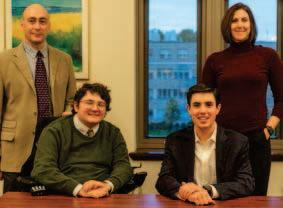
“It is not an initiative limited to BC, but is through BC for undergraduates who are working in theology,” Vicini said. “So it can become and is really becoming a platform for featuring one’s ideas, thoughts, critical engagement of authors, and I personally think is a great idea for students to have this possibility.”
The articles dive into various theological topics, from the history of feminist theology in the United States, to personal reflections on poetry and prayer, to comparative essays on Hindu and Christian visions of liberation, according to Wieboldt.
Sean O’Neil, MCAS ’23, wrote an essay on the Catholic Church’s use of Dignitatis humanae, a declaration of religious freedom by the Second Vatican Council in 1965.
“My argument in the paper is that the church published this document in an attempt to secure its own place in an ever increasingly secular world,” O’Neil said. “So the idea was that in forcing states to acknowledge religious freedom as a fundamental human right, the church could then build on that principle and create a space for itself, even though states are increasingly antagonistic towards the church.”
O’Neil said he never thought he would publish in an academic journal, and was excited to have his work be part of the first issue of Mystērion
“It was really exciting and I’m glad I get to be a part of that inaugural edition,” O’Neil said.
Wieboldt said he felt a sense of relief after publishing the first issue of Mystērion . Of the three other journals Wieboldt is involved in on campus, Mystērion has the most extensive editing process, he said.
Read the rest of this story at www.bcheights.com m
NEWS A2 MONDAY, NOVEMBER 1, 2021 THE HEIGHTS
Agape Latte will return to Hillside Cafe Tuesday at 7 p.m. with featured storytelling from John Walsh, director of creative video services at Boston College and BC ’17. The event will include live music, giveaways, and free coffee and desserts.
Grammy- and Tony-nominated actor Bryce Pinkham, BC ’05, will give a virtual lecture on Wednesday at 7 p.m. titled “Fear Into Fuel: A Gentleman’s Guide to Stage Fright and Other Scary Things like Climate Change.”
This Friday, BC football will be playing the annual Red Bandana Game against Virginia Tech at 7:30 p.m. The game is held in honor of former BC lacrosse player Welles Crowther, BC ’99, who lost his life saving over a dozen others during the Sept. 11 attacks.
1
This Week’s Top 3 Events Endowment, from A1
NICOLE WEI / HEIGHTS STAFF
Board members Conor McCormick and Tiffany Lee pose with Wieboldt and Vicini.
Tatte Opening in Newton Centre Is All the Talk-e
By Victor Stefanescu Asst. News Editor
The chic bakery and cafe chain Tatte opened its newest location in Newton Centre on Wednesday, bringing along long lines with its global pastries and upscale atmosphere to a neighborhood already crowded with coffee shops.
“I think it’s very popular,” said Newton resident Amanda Yu. “People [want to] come here.”
Tatte is not just another cafe conglomerate. Through the around-the-clock laboring of its founder Tzurit Or, a selftaught pastry chef from Israel who stepped down as CEO of the company in July 2020, the company made its start locally through a Brookline location in 2007, according to its website.
Tatte, which has now expanded beyond Brookline, operates out of 18 Boston-area locations, another four in metropolitan Washington, D.C., and as of Wednesday, a new one in Newton Centre, according to the website.
Aside from its made-to-order items, Tatte sells dozens of baked goods, ranging from puffy classics like the croissants to Israeli-inspired items like a Spinach Labneh

pita. Its drink menu also rivals the likes of any coffee shop.
An iced vanilla latte at the bakery is what you want it to be. Espresso flavors, while rich, do not overtake subtle splashes of real vanilla flavors. It costs just 50 cents more than the Starbucks alternative.
The Newton Tatte is sandwiched between a Sherwin-Williams Paint Store and the ramen restaurant Little Big Diner in an urban nook of the village. The bakery joins a crowded field of nine cafes in Newton Centre.
While Tatte offers its customers a nice sit-down environment, it is the kind of restaurant where you are unsure how to tip. Customers order their food at the up-front register, then pick up their coffee, and finally find a table where the food is brought out to them.
“It’s definitely not just a coffee shop,” Alex Thill, a Newton resident who learned about the new location through a neighbor, said. “But it’s also not a restaurant, you know. They don’t necessarily have a … ‘sit down and someone takes your order’ [kind of atmosphere].”
Rich coffee-shop aromas, modern furnishing, and the over 20 staff members flooding the cafe at a time make the space
feel mature. Overall, Yu said she liked her experience at the new location but that it might not be the best space for little ones.
“I think it’s good, like without kids,” Yu said. “I don’t know if we bring kids here if it would be the same experience.”
Similar in style to the other Tatte locations, the high top chairs, monochrome black and white paints, and big pane windows make the cafe feel as new as it is. That newness is also reflected in the quality of service, Newton resident Elle Nolan said.
“They’re super busy,” Nolan said. “It felt slow, but kind of methodical.”
Nolan said she fell in love with Tatte’s food long before the new location’s grand opening.
Tatte’s menu feels global. French toast and scrambled egg plates anchor the offerings. The three shakshuka options, a North African dish, allow customers to explore beyond breakfast basics.
The Mezze breakfast also adds a worldly dimension to the menu. The plate includes a cashew-pepper spread, a potent whipped feta and za’atar spread, and a grounding sunflower spread. Additionally, customers are able to order eggs cooked any way with a sesame-crusted Jerusalem bagel to use with the dip and a tomato
salad. Customers can rest assured that the poached eggs, if selected, will be cooked to poppable perfection.
Nolan’s favorite dish at Tatte is a potato, mushroom, and onion flatbread. The bakery did not have the flatbread on Friday, but did the day before, according to Nolan.
The puffy dough is stuffed with semisweet caramelized onions, potatoes, and mushrooms, Nolan said.
“The potato gives like a really nice texture to it all even though they’re not super flavorful,” Nolan said. “Mushrooms are kind of my favorite thing, so it sort of
rounds everything out.”
Yu, new to the neighborhood, also said she enjoyed the food at Tatte. Her and her partner got brunch at the bakery and topped things off with croissants, she said.
“We didn’t have too much experience here, but to compare my past experience in Texas–we moved from there—this is definitely above average,” Yu said.
Management from the new Tatte directed The Heights to contact corporate for comment on the opening of the new location. Corporate did not respond to The Heights’ request for an interview.
By Eliza Hernandez For The Heights
When Newton residents took to the polls during early voting for mayor and Newton City Council, many voters had issues such as zoning and education on their minds.
As of Friday morning, 1,193 voters cast their ballots during early in-person voting, which was held at Newton City Hall from Monday through Saturday of last week. About 4,400 to 4,500 voters sent in mail-in ballots, according to the City Clerk’s Office.
Residents were able to vote early in elections for mayor, ward councilor,
councilor-at-large, and school committee. Mayor Ruthanne Fuller is seeking re-election against former Newton City Councilor Amy Mah Sangiolo.
Voters can still cast their ballot on election day from 7 a.m. to 8 p.m. on Tuesday at designated polling locations throughout Newton. Drop boxes for mail-in ballots are located at city hall, according to Newton’s website.
Many voters said they chose to vote early in order to avoid the crowds often encountered when voting on election day.
“It gives people a chance to come out and then really look at the issues as opposed to rushing at the last minute to vote,” Newton resident Tyrone Powell said.
David Geffen said that early voting is important because not everybody has the time to stand in line on Tuesday. Garak Spicer echoed this sentiment, saying that early voting allows for greater accessibility and flexibility.
“I think you should be able to vote when it’s convenient,” Geffen said.
In this election, Spicer said that she is concerned with the building of new infrastructure and the high volume of traffic in the city. She said she wants the city to keep running smoothly.
For Sharlene Finkel, she said her main concern while voting was the construction of a 99-unit assisted living facility that will be built near her home on Boylston St.
“That’s my priority because we weren’t given advance notice of it,” Finkel said. According to Finkel, she voted to show her overall satisfaction with the city.
“I think it’s a great city,” Finkel said. “I’ve raised my family here, I have felt that the schools were good … and I like how they’re working on green space, and, you know, we’ve tried to be a caring community.”
Resident Dale Smith said she would like to see changes in the city’s representation. She said she wants to see affordable housing become less controlled by developers seeking profits and instead more reflective of the city’s goals. She also expressed her concern for Newton’s
public schools.
“I would like to have more investment in the schools and more investment in the students who learn differently, who are in the middle, and who I feel don’t get paid enough attention,” Smith said.
During this election season, Powell said that there are a lot of controversial issues being raised, including employment, issues related to race, health care benefits, and COVID-19 vaccines. He also said that this election, as well as larger state and federal elections, are dependent on the involvement of young people.
“I’m hoping that younger people today will start giving thought to the future,” Powell said.
Early Voters Express Concerns for Zoning, Education Household Items Now Available at Community Freedge
By Julia Remick Metro Editor
The newest addition to the Newton Food Pantry’s community freedge is a Welcome Home box. In partnership with Welcome Home, the box allows people to take household items like mugs, towels,

and blankets as they need.
The community freedge, located at 420 Watertown St. in parking lot space donated by Central Drapery and Dry Cleaning owner Mark Levine, opened in February to provide free refrigerated and pantry items 24/7. A part of a nationwide free fridge movement, the Newton
Community Freedge aims to fight food insecurity while also allowing anonymity for those taking from the fridge.
“The idea is that someone who may be suffering from food insecurity may benefit from other social services … they might need dishes or plates or utensils to eat the food that they’re getting from the freedge,” Regina Wu, director of the Newton Food Pantry, said. “I do suspect that we probably have some homeless that are coming to use the fridge, and it kind of makes sense [to] have the two resources there on the same site.”
Welcome Home helped to install the white Welcome Home box beside the freedge on Oct. 17, according to Wu and Julie Plaut Mahoney, board president and executive director of Welcome Home. The sign on top of the box asks patrons to select two items for their home and says the box is restocked several times a week.
Volunteers Gail Shine and Sarah Housman will stock the box three times a week with items from Welcome Home,
according to Plaut Mahoney.
“The thing about the fridge and the box [is] it’s not staffed, and it’s really meant to be dignifying and that people can come and take items, and you’ll hope it’s being used responsibly,” Plaut Mahoney said.
Since implementing the box, Plaut Mahoney said that every time the box has been restocked, it has been emptied.
Providing multiple resources in one place helps to make the lives of those in need easier, Wu said. For people who would like to donate items, Wu said they can bring items directly to Welcome Home.
“One stop shopping, I imagine, would really be a useful thing for people in need of these resources instead of having to go here and there across town to get what they need to have it all in one place,” Wu said.
Welcome Home and the Newton Food Pantry have a longstanding partnership, according to Plaut Mahoney and
Wu. When Plaut Mahoney first heard about the community fridge movement, she said she knew Welcome Home had to get involved, as it is closely related to the organization’s philosophy.
“It seemed kind of like a natural kind of segue to consider when we open the freedge that maybe supplying small houseware items like dishes and cups and silverware might be something useful to users of the freedge,” Wu said. “And so we had talked about it but knew that that was kind of a second-tier step after we got the fridge up and launched and working well.”
Plaut Mahoney said she envisions Welcome Home boxes at as many community fridges as possible. Plaut Mahoney also said that people who run community fridges should reach out to her to help establish more boxes for ease of access.
“We want to lower barriers to entry for people who are using and relying on social service agencies for food and home goods and diapers,” Plaut Mahoney said.
METRO A3 MONDAY, NOVEMBER 1, 2021 THE HEIGHTS
VICTOR STEFANESCU / HEIGHTS EDITOR
The Mezze breakfast plate exemplifies Tatte’s global menu with Israeli influences.
Regina Wu, Jennifer Riff, Sarah Housman, and Dhruv Lal showcase the new box.
PHOTO COURTESY OF JULIE PLAUT MAHONEY
Chasing Ghosts
 BY JACK BERGAMINI For The Heights
BY JACK BERGAMINI For The Heights

After losing three straight games to ACC opponents, Boston College football needed a change. In the second quarter of BC’s Saturday game against Syracuse, change arrived. Dennis Grosel found his seat on the bench as true freshman Emmett Morehead took his first career snaps as an Eagle.
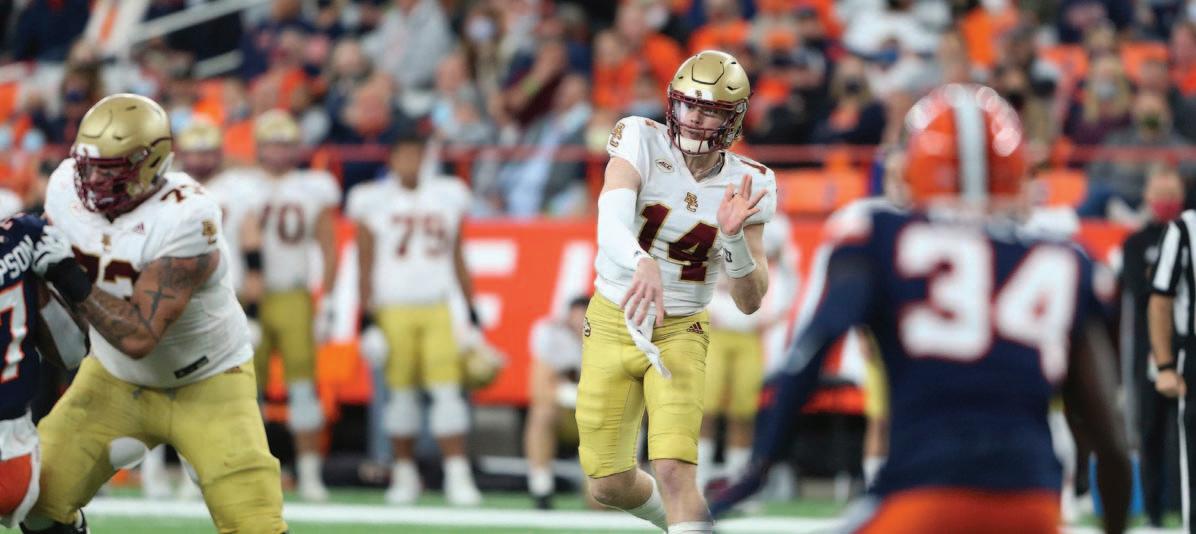
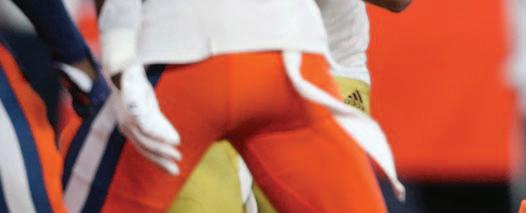
Grosel wouldn’t be exiled to the bench for long, as he was reinserted into the game multiple times in what became a rotating quarterback situation for the Eagles.



The highly anticipated quarterback change did not cause an offensive renaissance for BC (4–4, 0–4 Atlantic Coast). Instead, it was the defense that kept them in the game against Syracuse (5–4, 2–3) through three quarters. No amount of defense, however, could make up for the mere six points scored by the Eagles in what became a 21–6 loss.
Grosel started Saturday’s game looking promising, converting on two short passes to receiver Zay Flowers and Jaden Williams. BC marched downfield with three straight first downs, and the first score of the game looked imminent. After an 8-yard run by Grosel put the Eagles within field goal
range on the 28-yard line, Hafley made the decision to go for it on fourth down.
Grosel could not find an open receiver on 4th-and-4, and the BC offense jogged off the field without a score. That turnover on downs was the first of a theme throughout the game, as BC repeatedly failed to take advantage of scoring opportunities.
BC was, however, able to make plays on the defensive side of the ball. With Syracuse in scoring position at BC’s 3-yard line, quarterback Garrett Shrader was hit by defensive end Marcus Valdez as he threw. He fumbled the ball, and linebacker Vinny DePalma scooped it up, returning it for 21 yards.

“It was one of those plays where you don’t know if it’s an incomplete pass or a fumble,” DePalma said. “We drill it all the time in practice, just pick it up no matter what and let the rest get sorted out.”

Syracuse could not get anything going offensively, struggling to utilize its dual-threat weapons of Shrader and running back Sean Tucker. Both teams were scoreless after the first quarter when Morehead took the field at the start of the second.
 BY EMMA HEALY Sports Editor
BY EMMA HEALY Sports Editor

A perfect 4–0 start has all but gone by the wayside for Boston College football, as the Eagles are winless through their first four games of ACC competition. Without Phil Jurkovec in the backfield, the Eagles are floundering and looking for answers. A rotating quarterback system, a struggling offensive line, and struggle in execution led to a loss to Syracuse—BC’s first against the Orange in the teams’ last three meetings. Here are four takeaways from the Eagles’ 21–6 loss in the Carrier Dome:
Airing Out Dirty Laundry
After three losses to open the Eagles’ ACC run, it was time for a change. The passing game had struggled in ACC play entering BC’s game against Syracuse, and though Dennis Grosel got the start, BC head coach Jeff Hafley and offensive coordinator Frank Cignetti Jr. opted to rotate in Emmett Morehead at quarterback. Change, however, does not always mean progress. A rotating quarterback scheme was not the solution to the Eagles’ woes through the air, as the quarterback duo combined for just 180 passing yards and no touchdowns. Without consistency in the backfield, the Eagles floundered on offense, and Morehead and Grosel both struggled to hit receivers downfield, repeatedly overthrowing a speedy Zay Flowers and an acrobatic Jaelen Gill.
Grosel threw for 93 yards on 9-of-17 passing, while Morehead tossed 87 yards on 6-of-15 passing. It’s a far cry from the 303 yards that Jurkovec threw for against Colgate to open the season.

Drawing the Line





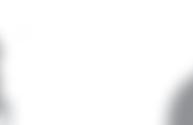
BC’s highly touted offensive line has struggled in ACC play, and those struggles are only compounded by a lingering injury to Tyler Vrabel. After being day-to-day in practice this week, according to Hafley, Vrabel continued to struggle against Syracuse, as the veteran made an early exit. Jack Conley and Ozzy Trapilo came in in relief, but the two young players struggled to match Vrabel’s four years of experience. Even with Vrabel, the offensive line struggled against a potent Syracuse front seven.
The Eagles allowed five sacks against their rotating quarterbacks, three of which came from defensive end Kingsley Jonathan, for a total of 25 yards lost on Jonathan’s efforts alone. With a true freshman quarterback playing in his first collegiate game–and his first game since his junior year of high school—the offensive line needed to create time in the pocket, allowing Morehead more leeway in decision making, but the Orange penetrated the pocket just moments after nearly every snap. Hafley said in his press conference on Sunday that he will be making changes—either personnel or scheme—to the unit this week.
Hit the Wall Running
The offensive line’s performance also hindered
with a lack of passing offense and a brand new quarterback, needed to be in top form for the Eagles to have a chance. Syracuse’s front seven filled the gaps seemingly with ease, and BC only managed 71 net yards on the ground: 136 gained and 65 lost. Of those 65 yards lost, nearly half of them were a result of sacks against Morehead, resulting in 32 lost yards for the true freshman quarterback. BC’s 71 yards on the ground marks its second-lowest total this season, with the only lower total coming against Clemson, when the Eagles struggled to register 46 yards on the ground. Still, as he has been all season, Pat Garwo III was a bright spot in the backfield against Syracuse, grinding out 84 yards on the ground despite a struggling run-blocking system.

Giving Up Explosives
All three of Syracuse’s touchdowns came on runs 48 yards or longer, as running back Sean Tucker opened the Orange’s scoring with a 51-yard dash in the third quarter, and evasive quarterback Garrett Shrader dashed for a 48-yard house call up the middle. Syracuse’s third and final score came on a 64-yard punt return to the house, putting the final nail in BC’s coffin. On all three of those scoring plays, missed tackles plagued the Eagles in the early phases, leading to a field of green in front of each runner and next to no challengers from behind.
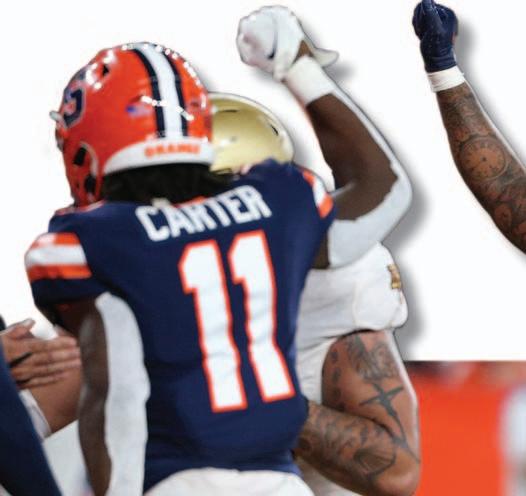
In practically every press conference, Hafley emphasizes the importance of “execution,” which includes making routine tackles near the line of scrimmage to prevent big-gain plays.
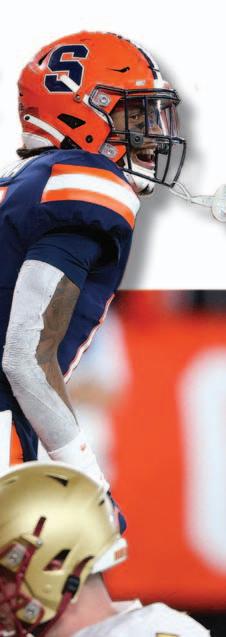
SPORTS A4 MONDAY, NOVEMBER 1, 2021 THE HEIGHTS
BC head coach Jeff Hafley used two quarterbacks—graduate student Dennis Grosel and true freshman Emmett Morehead—to try to solve the Eagles’ offensive woes, but BC dropped its fourth straight game with a loss to Syracuse.
COURTESY OF AP PHOTO
M h d d Grosel both to it receivers downfield, overpeedy Flowers
that he will be making changes—eith or scheme—to the unit this Hit the Wall e offensive line’s perthe Eagles’ run me, which,
go g
Grosel the Ea w fi
nt.
thro and an acrobatic Jae
s f gae,wc,
College Syracuse 6 21
Boston
COURTESY OF AP PHOTO
Eagles Fight for One-Point Victory Over Vermont
BY ROBERT BRENNAN For The Heights
On “Trick or Treat Night” at Gutterson Fieldhouse in Burlington, Vt., students came dressed in costume to watch Vermont men’s hockey. Some poked fun at Boston College, such as one student dressed as the Pope, but their taunting didn’t faze the Eagles.
saves from BC goaltender Eric Dop. Dop couldn’t control the third shot, however, as Simon Jellus sent in the initial attempt and Philip Lagunov cleaned up the rebound to take an early 1–0 lead.
Boston College Vermont 3 2
BC played the physical, fast-paced brand of hockey that brought it an NCAA Tournament berth and a top NCAA ranking a season ago. After losses to unranked teams Colorado College, as well as to Vermont the previous night, BC (4–3–1, 2–1–0 Hockey East) avenged its loss from the night before with a 3–2 win over the Catamounts (1–5–0, 1–1–0) on Saturday.
The first period featured lots of action from both teams despite just 17 combined shots. Until a cross-checking penalty on Drew Helleson led to a Vermont power play with five minutes left in the period, Vermont had only forced two
After the Eagles’ first power play, which Vermont killed, it seemed like Saturday would be a repeat of the previous night, when Vermont held the Eagles scoreless on four power plays. But on the Eagles’ next man advantage, Helleson fired a rocket on Vermont netminder Tyler Harmon that Jack McBain redirected into the back of the net to tie it up at one apiece with under one minute left in the first period.
One minute was all Vermont needed, however, as Lagunov caught Dop out of position again, cleaning up a rebound from an initial shot from the blue line by Luca Münzenberger.
The second period was opposite to the first. Despite both teams putting more pucks on the net, only one found the net, which came on a very similar play as the Eagles’ first goal. Helleson hit a slap shot that was too hot for Harmon to handle, and McBain cleaned it up by
sneaking it past the goalie’s left skate to tie it up at two.
Harmon made two outstanding saves, one on BC’ captain Marc McLaughlin on a great chance and another where he closed the five hole on Mike Posma on a shot that looked sure to light the lamp.
Harmon continued this form in the third period with several stops in quick succession on point-blank chances by BC,
and the Eagles couldn’t put the puck past him as he sprawled across the goal line, denying another BC chance.
Despite Harmon’s efforts, Trevor Kuntar elevated a one-timer into the top corner on Harmon’s glove side. The Catamount bench contested the zone entry, but officials ruled that Colby Ambrosio and Eamon Powell, who earned assists on Kuntar’s goal, crossed the blue line legally
before Powell’s pass across the slot, which led to Kuntar’s goal.
The Eagles dominated the stat lines, as they outshot Vermont 31–13. BC’s attack was constant and even throughout the game, as the Eagles put up double-digit shots in each of the three periods. The Eagles were also efficient on the power play after a rough previous night, converting on two of their three man advantages.

BC Swept by Northeastern in Two Games
FOOTBALL
Last Game: L at Louisville (14–28)
Next Game: at Syracuse, 3:30 p.m. Saturday
MEN’S HOCKEY
Last Game: W vs. Denver (5–1)
Next Game: vs. Vermont, 7 p.m. Friday
WOMEN’S HOCKEY
Last Game: W vs. Maine (5–2) Next Game: vs. Northeastern, 6 p.m. Friday
MEN’S SOCCER
Last Game: W vs. Wake Forest (3–2)
Next Game: at NC State, 7 p.m. Saturday
BY OLIVIA NOLAN Heights Staff
In the history of competition between the women’s hockey programs at Boston College and Northeastern, the squads have played 42 games at Northeastern’s Matthews Arena. The results over the years have boiled down to an even split. Each team has come away with 20 wins, with two ties added in for good measure.
tion was short lived, however, as Jillian Fey took a cross-checking penalty in front of the Huskies’ net one minute later, and the Eagles’ power play was cut short.
Boston College Northeastern 0 3
The scoreline read 0–0 at the conclusion of the first period, though not for a lack of trying on either side. BC recorded 12 shots in the period, all of which were turned away by Northeastern’s veteran goaltender Aerin Frankel.
Goffredo has already potted the first two goals of her career, and she picked up two assists and 17 shots.
Goffredo contributed all game to BC’s success in the neutral zone, using her speed and puck handling to move swiftly through center ice and into the Eagles’ attacking zone.
lofted a shot in from the blue line, and Chloé Aurard deflected the puck past Levy, driving a dagger into the hearts of the Eagles.
Last Game: L at Virginia Tech (0–1)
Next Game: vs. Clemson, 5 p.m. Thursday
VOLLEYBALL
Last Game: L vs. Georgia Tech (0–3)
Next Game: at Florida State, 6:30 p.m. Friday
WOMEN’S SOCCER FIELD HOCKEY
Last Game: W at Northeastern (2–1)
Next Game: at Wake Forest, 4 p.m. Friday
In the two teams’ 43rd game at Matthews, the Eagles (6–2–0, 4–2–0) looked to avenge a loss to the Huskies (7-2-0, 6-2-0) the night before and capture the advantage in wins on No. 6 Northeastern’s home ice. No. 8 BC, however, was shut out by its Beantown foe 3–0 and came away winless on the weekend.
Penalties plagued BC throughout the game. Things looked hopeful for the Eagles early on, as Northeastern’s Maureen Murphy was whistled down four minutes into the game on a hooking call. BC’s ela-
Though BC held the advantage in shots with 12 over Northeastern’s nine, that stat does not paint the full picture of the period. Many of the Eagles’ shots were taken from the perimeter of the rink, which Frankel easily grabbed. Northeastern, on the other hand, had a number of high-quality scoring opportunities and tested BC goalie Abigail Levy from the first puck drop.
Caroline Goffredo was a bright spot for the Eagles in the loss. The sophomore winger has shown tremendous growth from a freshman campaign in which she recorded three assists and 20 shots on goal. In just eight games this season,
In the second period, Fey’s physical play caught up with her once again, and she was called for body checking in the middle of yet another BC power play. This miscue proved more costly, as Maddie Crowley-Cahill was called for tripping just 11 seconds later, and Northeastern was gifted a 5-on-3 opportunity.
Maddie Mills capitalized on the opportunity, deftly deking out Levy and the BC penalty killers and slotting the puck home to put Northeastern on the board in the second frame.
BC looked to escape the second period with minimal damage aside from Mills’ tally, but its hopes were dashed with just 11 seconds left in the period.
Northeastern defender Skylar Fontaine
Aurard’s goal seemed to deflate BC, and the Eagles had trouble sustaining offensive pressure throughout the third period. BC recorded just five shots in the frame, and officials called the Eagles for an additional two penalties, adding to their game total of seven.
BC made one final bid for a score in the waning minutes of the third frame. Deirdre Mullowney unleashed a booming shot from the point, and Hannah Bilka got her stick on the puck for a tipping attempt. Frankel came up with a pad save to preserve her shutout, and the Eagles walked away with a loss.
Despite the loss, Levy showcased strong play throughout the game, coming up with 35 saves on Northeastern’s gifted forwards. She solidified herself as BC’s top goaltender in the latter half of last season and has picked up right where she left off for her senior campaign.
BY NICK PULICE Heights Staff
end their regular season with a 2–1 victory.
quiet first half, as she did not have to face a single shot on goal.
Boston College Wake Forest 2 1
Boston College field hockey was just over a minute away from finishing off its regular season with a pivotal road victory against Wake Forest. With 1:14 remaining in the game, Wake Forest’s Nat Friedman found herself streaking toward the goal with the ball on her stick and no defender in sight.
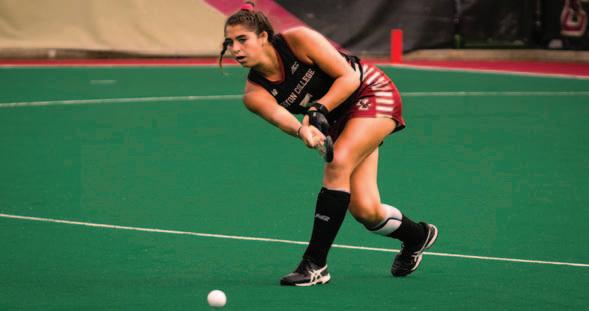
She fired a hard shot on goal that appeared destined to tie it up late, but BC goaltender Jonna Kennedy single-handedly saved the day. The veteran goaltender dove to her right and made a spectacular stick save to stop Friedman and preserve a crucial victory for BC.
Thanks to Kennedy’s save, the Eagles (12–5, 3–3 Atlantic Coast) held off the Demon Deacons (7–9, 1–6) to
With the win, the Eagles will travel to Syracuse next weekend to take on Virginia in the ACC Tournament riding a three-game win streak with momentum on their side.
Just a few minutes into the game, BC appeared to have its first break, as a loose ball found Nell Webber at point-blank range, and she rifled a shot into the back of the cage. The Eagles had already begun to celebrate, but officials called the goal back after ruling it a dangerous play.
Later on in the first quarter, BC’s Sky Caron committed an almost costly turnover in the defensive zone.
After the Deacons took over possession, Kennedy blocked a Wake Forest centering attempt to keep the game scoreless.
Wake Forest’s lone penalty corner, which BC blocked, came in the first quarter. Otherwise, Kennedy had a
The Eagles mustered some chances in the second quarter, but Wake Forest goalie Tori Glaister made two saves, including a stop to deny Webber once again.
BC picked up its game in the third quarter. Four minutes into the frame, Margo Carlin made a terrific steal. She kept possession and took the ball down the right flank and completed a perfect pass to Webber, who now found herself staring at a wide-open net. Webber cashed in to give BC a 1–0 lead, finally scoring after coming so close in the first half of play.
Just a few minutes later, the Eagles doubled their lead on a penalty corner opportunity. Caron’s shot off the corner was redirected by a Wake Forest defender in front of the goal toward Elizabeth Warner. Warner got her stick on it and watched the ball slowly trickle over the goal line to give BC a
Three
Following the goal, the Eagles had
Kennedy’s save with just over a minute to go preserved the lead and ultimately the victory for BC. Her only save of the day was a big one.
SPORTS A5 MONDAY, NOVEMBER 1, 2021 THE HEIGHTS
two-goal advantage.
minutes into the final quarter, Wake Forest got on the board. Meike Lanckohr rocketed a backhand shot past Kennedy and into the net to make it a 2–1 game with just over 12 minutes to go.
some penalty corner chances. Though they came close to adding to their lead again, Glaister and the Wake Forest defense stood tall.
The Eagles beat UVM 3–2 on Saturday night following a devastating Friday night overtime loss.
IKRAM ALI / HEIGHTS EDITOR
The Eagles held on to beat Wake Forest 2–1 Friday afternoon.
NICOLE WEI / FOR THE HEIGHTS
BC Holds
Wake
Regular Season Finale
off
Forest in
MAGAZINE
Savoring the Season: How To Navigate Fall in Boston
 BY CAROLINE QUINN Heights Staff
BY CAROLINE QUINN Heights Staff
With fall well underway, I’ve found that if I don’t plan out ways to make the most of the season, winter hits before I’ve even had the chance to. We only get one window of time every year to enjoy the changing leaves and vibrant Boston scene until the snow comes. Many of these activities weren’t possible last year because of COVID-19, so read on to find out my tips for getting all that you can out of this fall season.
Cycle Boat Boston
As October ends and November begins, now is the perfect time to gather a group of friends and pedal your way around the Boston Harbor on a cycle boat while the weather is still nice! Cycleboat Boston offers pri-
vate charters for groups of up to 26 people as well as sunset and harbor cruises. Make sure to make your own food and drinks to enjoy while taking in the sights and sounds of the harbor.
Time Out Market
If you’re hungry, head over to Fenway and check out Time Out Market, where you can indulge in some of Boston’s best dishes and drinks— all under one roof. Time Out Market, which has locations all over the world, aims to bring a city’s best food, drinks, and culture together. Here in Boston, you can sample a variety of chicken dishes including gyoza and chicken and waffles from Ms. Clucks Deluxe Chicken and Dumplings, design a custom charcuterie box from

Kured—which was founded by Gilli Rozynek, BC ’20—and then finish off with donuts from Union Square Donuts.
Lookout Farm
If you are looking to escape from the city, go check out Lookout Farm in South Natick. Even though it is a bit of a drive away from campus, it is well worth it if you’re looking for the classic New England fall experience. Enjoy apple and pumpkin picking, treat yourself to an apple cider donut, and eat lunch outdoors at its restaurant which offers a variety of food and house-brewed ciders. For something a little closer to campus, try Allendale farm in Brookline.
Walk the Charles
Next time you’re itching to get outside before it gets painfully cold, I recommend taking a walk along the Charles River. Grab a friend and set up a picnic or rent a Bluebike and cruise along the water. Besides the extra dose of fresh fall air, you’ll also
Go to a Sporting Event
Whether it’s at Boston College or a professional stadium, the opportunity to go to a nearby sporting event feels even more special after two years of having to watch from a screen. Support BC football at its final home games or go into the city and see the Bruins or the Celtics start off
their winter seasons at TD Garden. TD Garden is only a short ride away on the T, and you can make a whole night out of it by grabbing dinner around the stadium.
Halloween in Salem
With its rich, dark history, Salem, Mass. is the perfect spot for a day trip this time of the year. Visit the Salem Witch Museum or the Salem Witch Village to learn more about the infamous witch trials and stop by the Haunted Happenings Marketplace, which is filled with vendors, food, and music.
House of Blues
Music lovers should definitely make sure to check out the upcoming concert schedule at House of Blues. It has a variety of artists this fall from a wide range of genres. Some upcoming concerts are Surfaces on Nov. 3, Finneas on Nov. 18, and Jordan Davis on Dec. 19—but there are many more in between.
Erbil Bridges Istanbul and Boston in Economic Studies
BY ONUR TOPER For The Heights
Nearly 5,000 miles east of Boston College lies the city of Istanbul, Turkey—a metropolitan jewel that sits on two continents, bridges East and West, and is the catalyst behind Can Erbil’s journey to BC and his study of economics.
Growing up in Istanbul, Erbil had a front-row seat to the Turkish economy, where he saw the impact that public policy can have on people’s daily lives.
“When I was living in Turkey, it was practically a closed economy,” he said. “It was a completely different structure from what we are experiencing here. I also lived through a time of persistently high levels of inflation, and I saw what it does to people and the livelihood of people and financial systems.”
This experience, coupled with his love for numbers and communication, ultimately led him to economics. Before this passion materialized, the young Erbil wanted to become an industrial engineer. It wasn’t until a family friend praised his instinctual talent for talking and told him a career in economics may be one where he can exhibit this talent that he changed course.
After doing some research in his final year of high school, Erbil found that economics is the best of both worlds, he said—he could combine his love for numbers and communication into a profession that would suit his work style.
“It’s kind of like the engineering of the social sciences, so you just crunch the numbers like the engineers, but you talk about it, and you try to make good public policy,” he said. “The very short talk with [my family friend] made a big influence on me.”
As an undergraduate studying economics at Boğaziçi University, one of Turkey’s top universities, a variety of opportunities opened up for Erbil, including the possibility to pursue a graduate education in the United States.
One of his professors saw Erbil’s potential when he served as a teaching assistant and research assistant for him and recommended that 22-year-old Erbil apply to BC. After a pen-and-paper application process, Erbil was accepted into BC’s economics master’s program and arrived on campus in 1993.
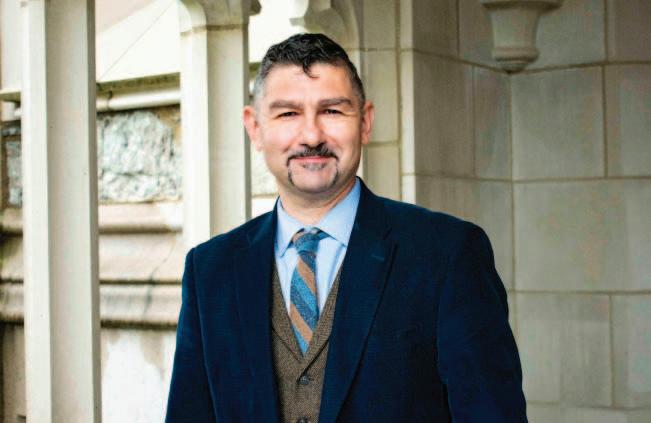
Erbil was a driven student, and took the time to deeply engage in his studies while taking advantage of on-campus leadership roles. As the vice president of the graduate student association and the president of the international student graduate student association, Erbil made himself known as a leader among graduate students at BC.
He received his master’s degree in economics in 1996. After earning his Ph.D. in economics from BC in 2001, he went on to become an assistant professor at Brandeis University, before returning to BC in 2012 as an associate professor.
Today, Erbil is a professor in the economics department and has over 25 years of teaching experience. He has taught courses on international trade, macroeconomic theory, and many more, but perhaps he is best known for teaching Principles of Economics—a one-semester, lecture-based course, focusing on the foundational aspects of economics.
“I think [the course] can be really impactful if it is taught well,” Erbil said. “My Principles professor made a really big influence on me. … And I always thought that I’m gonna push myself as much as I can to reach his level of excellence—and I’m still doing that. I truly believe that a good professor is a student at heart, and I continue to learn.”
Chair of the economics department Christopher Baum said that Erbil has risen to the challenge of teaching a course like Principles, where there is a great variety in students’ interest levels in the subject.
“He’s always done a very good job with the large Principles class,” Baum said. “It’s a difficult task because you’re trying to pitch this content to people who have this as their last economics class and for people who might continue and make it into their major. You want to have the appeal to both, and he’s someone who can do that very well.”
Baum, who first met Erbil in 1993 when he was beginning his graduate studies at BC, said Erbil is a perfect fit for BC’s economics department, considering the breadth of experience he brings to the table, as well as the research interests he holds in current issues.
Erbil’s passions outside the classroom enable his students of which
there are 500 just this semester to learn from a professor who utilizes real-world issues in the classroom. One of these students is Charlie Schulz, MCAS ’25, who said Erbil stands out as an engaging professor.
“Everyday you walk into blasting music, and he takes requests,” Schulz said. “[In] a lot of classes, it’s really quiet, but when you walk into his class everybody’s talking, and it’s a good atmosphere. He’s very engaging, and it seems like that’s his mission to engage and get people interested.”
Erbil’s curiosity and desire to learn were particularly helpful while teaching online during the pandemic. Two years before COVID-19 sent BC students home, Erbil was one of the very few faculty members who enrolled in a workshop on how to teach online, which was open to all faculty. He completed the introduction, intermediate, and advanced classes to get a solid grasp on the fundamentals of online instruction.
Once the pandemic hit, Erbil began implementing what he learned from the workshop into his instruction.
“I had a plan, and I knew what would work and what wouldn’t,” Erbil said. “For me, it was maybe four or five times more work than I had ever done, but I wanted to make sure that the online teaching and learning platform that I created was second to none … I made sure that there were elements that made it even better than teaching in person.”
Erbil spent much of summer 2020 building a studio for teaching, learning, and recording at home, he said. He took digital photography and video editing courses in order to create the best teaching environment possible, he said. Erbil didn’t stop with helping out his own students—he also worked with his colleagues on ways to improve their online instruction, a move that Baum praised.
“He … put a tremendous amount of effort into the remote learning experience when it became clear that that’s the way it’s going to be back in March 2020,” Baum said. “He not only did a very good job with his own class, but he did a lot to help colleagues who were struggling with how to make this work ... He was one of the most capable people in handling that transition.”
Although Erbil is most prominently known for his role as an economics pro-
fessor, his work in the field expands far beyond the boundaries of teaching.
Outside teaching, much of Erbil’s time is spent doing economic modeling with organizations like EcoMod—the largest economic modeling network in the world—where he is the director of the Modeling School.
Boasting a large network and international alumni base, the organization held workshops before the pandemic in Prague in the summer and in Singapore in the winter, both at which Erbil taught.
case for structural change in America. He also published a policy brief with BC professor Geoffrey Sanzenbacher on how to teach inequality in a principles course, and he co-taught a summer course at Harvard on economic inequality.
He said that his new focus on inequality is important to him, but he is also interested in making economics more understandable to a wider audience.
He points out that economists do
Erbil brings his experiences from growing up in Turkey to the classroom.
Erbil, who speaks Turkish, German, and some Italian, is also a research fellow for the Economic Research Forum, which produces policy and research debate in Middle East economies.
He also serves on other boards that foster his knowledge of international economics and provide for valuable experience that he can utilize in the classroom.
“It’s very important to me that I also stay active outside of the classroom because there is a big spillover effect with research and teaching,” Erbil said. “These are important for sharing the applied view of economics, especially when they have big questions about investments for the future.”
Erbil’s initiatives outside of the classroom also relate to innovation and technology, as well as issues like economic inequality, which Erbil has been focusing more on recently.
Following the murder of George Floyd, Erbil penned an op-ed examining income inequality and laying out the
well in their professions, but they need to convey their knowledge in better ways.
“We do a good job but very few people understand what we are doing,” he said. “We are not good communicators. I am actually committed to having students who are better communicators than us—so that’s my biggest overall big picture goal.”
As the only person out of his Ph.D. class who entered academia, Erbil is working toward this goal by teaching his students how to effectively communicate economic policies and by conducting research outside of class.
He emphasized that he enjoys the freedom of being able to set his own research agenda, as well as the academic environment that comes with being a professor.
“It’s very rewarding,” he said. “If you enjoy what you are doing, you are always working to do it better and at the end it shows, which is something that I also recommend to many of my students.”
get a great view of Boston’s changing leaves. There are even river
take you along the Charles for an even better view of what fall has to offer.
A6 MONDAY, NOVEMBER 1, 2021 THE HEIGHTS
GRAPHICS BY OLIVIA CHARBONNEAU / HEIGHTS EDITOR
MOLLY BRUNS / HEIGHTS STAFF
one winy year ging nt l u If gr y to b an roof Market leaves. There are even river c r uises that will tkl n finish off Doeso ell for the perience. n
itt TD Garde on ou t H t th or to mo th e Hau lh
ider donut,
‘Spring Awakening’ Explores Complex Adolescent Love
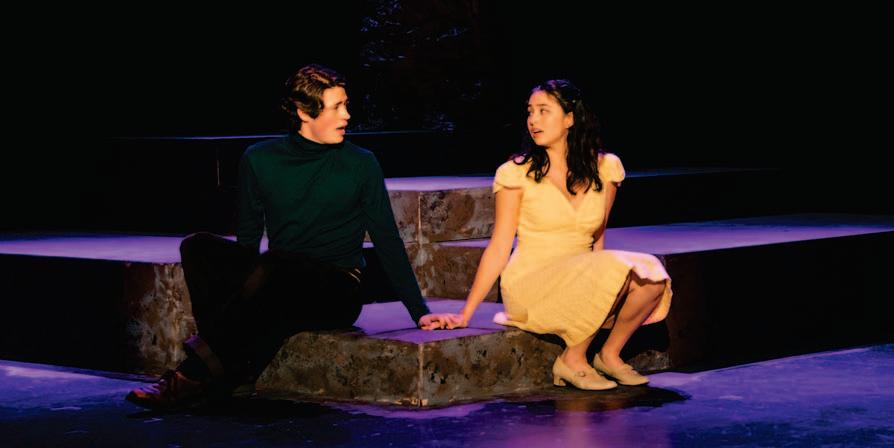 BY SIOBHAN PENDER For The Heights
BY SIOBHAN PENDER For The Heights
Returning to in-person performances after a year-long hiatus from performing in front of audiences, the Boston College Dramatics Society kicked off their season with the sensational Spring Awakening musical, a show that tackles themes of assault, mental health, and sexual exploration.
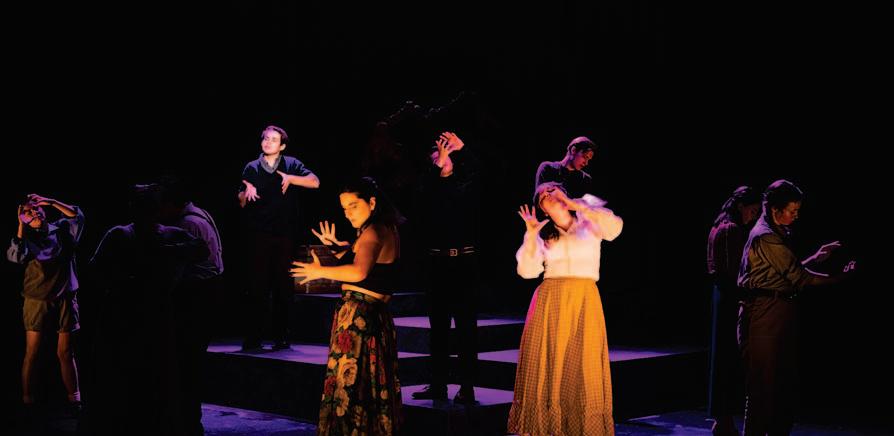
From Oct. 28 to Oct. 30, the BC Dramatics Society presented Spring Awakening, directed by Devyn Itula, MCAS ’22. The musical follows a group of Protestant teenagers during the late 19th century in Germany as they explore adolescence and sexuality while under the watch of their ultra-conservative parents and other adults.
The performance occurred in the Bonn Studio Theater, which is BC’s black-box theater reserved for small performances, creating an intimate audience environment.
The two-act musical elicited strong reactions from the audience due to the skill and talent of the 13-member cast.
In the musical, the story follows 14-year-old Melchior, played by Gabriel Biagi, MCAS ’25, as he tries to find himself. The play focuses on the relationships Melchior has with his friends and with Wendla, played by Myla Pellegrini, MCAS ’25, a 14-year-old who runs across Melchior’s path.
Throughout the musical, the group of teenagers confront contemplations of suicide, complex conversations about sex and consent, and their desires for physical intimacy—primarily expressed through the song “Touch Me.”
The show was a major success when it debuted on Broadway in 2006. Based on a 1891 play written by Frank Wedekind under the same title, composer Duncan Sheik modernized the story with his folk and alternative rock score.
The musical became increasingly popular—later touring the United States in 2008 and opening in London in 2009.
The stage design and direction utilized the small stage space by relying upon very few props for setting the scenes in the play—mostly wooden boxes that would serve as seats, desks, flowerboxes, and even tombstones, with a large tree standing at the back of the stage.
The first large group performance of “Touch Me” in Act I established the atmosphere and trajectory of the show, with each character kind of in their own world as they were starting to understand their own sexuality.
In Act II, the performance of “Don’t Do Sadness / Blue Wind” was captivating with the use of lighting effects that highlighted each character in either a blue or red stream of light.
The performance of “Totally F**ked” in Act II involved the entire cast, and the power and intensity of the song were matched by the choreography on stage.
“It was really awesome performing live theatre after a year and a half of COVID and not being able to perform in front of a live audience,” Catherine Marra, MCAS ’22, who played one of the teenagers in the show, said. “It was really a lot of energy and a lot of fun, and I’m happy to be back.”
After a year of modified and virtual theatrical performances, the BC Dramatics Society’s return to an in-person, maskless performance allowed the actors to play off the audience’s reactions to the musical’s shocking plotline.
“[With] such an emotional show like [Spring Awakening] where there is so much going on and so many little moments, it was so fun to finally have a live audience and feed off of their reactions,” said Kathleen Meade, MCAS ’22, who played Adult Woman, a role which encompasses all adult female characters in the show.
The small-stage setting, the intimate audience, and the emotional, moving messages of the performance made for a captivating show in the sold-out Bonn Studio Theater.
The hauntingly beautiful end num-
ber of “The Song of Purple Summer” was a powerful close, as it highlighted the glimmer of hope for the summer to come, after the show endured trials of sadness.
Artist Nettrice Gaskins Blends Design and Technology
BY MEADOW VRTIS
For The Heights
Presenting a digital self-portrait that blended images of nature and vibrant colors, Nettrice Gaskins— who teaches, writes, and makes art using algorithms and machine learning—spoke virtually on her work and creative process, followed by an interactive Q&A session surrounding her perception of art in the digital age.
On Wednesday, Gaskins was the second speaker of the academic year for the Currents Presents series, co-sponsored by the art, art history, and film department at Boston College.
She was introduced by professors Greer Muldowney and Jane Cassidy.
“[Gaskins] explores techno vernacular creativity and Afrofuturism,” Cassidy said. “And she’ll talk to us a lot more about how it refers
to innovations produced by ethnic groups that are often overlooked.”
Following her introduction, Gaskins described her creative process, starting with her first introduction to digital creation: her high school computer graphics class in 1987.
She was interested in symbols, culture, and poetry, and the digital landscape allowed her to build her simulation—and it bred her innovation.
“It allowed me to do things that I
cannot do and most people cannot do,” Gaskins said.
But in a virtual space, it became possible for Gaskin to bend artistic rules. From there, Gaskins moved toward working with artificial intelligence (AI).
Next month, her work will be on display at the Smithsonian. The exhibit will feature 11 of her works, which consist of portraits of futurists and were created using AI technology.

Among these works is a self-portrait—a piece that shows Gaskins surrounded by multicolored digital tiles and wearing a colorful scarf. She said her inspiration comes from an algorithm that repeats circle patterns.
“You create the basic motif as a circle,” Gaskins said. “And you repeat copies of the motif around a hyperbolic plane.”
Gaskins said this spurred her toward the techno-vernacular, as the circle motif allowed her to connect with artifacts tied to her heritage— medicine wheels, coulombs, and cosmic grams.
All these things are algorithmic, which allow for computational work.
The Afrofuturism algorithm is about deep learning, which is a subset of AI, according to Gaskins Gaskins also deals with biomimicry.
For her artwork, she works with objects in nature—like a hummingbird dipping its beak into a flower
and scenes of rivers and forests— which inspire her pieces.
From there, she comes in with AI to redesign these images. Following her presentation, Muldowney and Cassidy opened the floor for questions.
One of the questions posed to Gaskins asked her about her view on what constitutes art and whether that idea has changed since she started working with technology.
“There’s, you know, an idea and a way to express that idea using different media,” Gaskins said. “That’s basically what art is—people expressing themselves using mediums [and] different media.”
Gaskins said she believes art isn’t static, rather that it is always evolving.
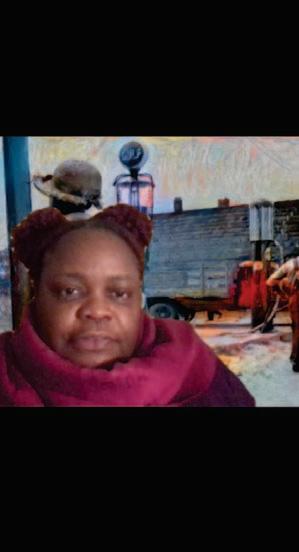
The idea of art has simply gotten bigger, broader, and more encompassing of a variety of different media since the introduction of technology, she said.
For Gaskins, digital art is a new language and aesthetic, but the desire of expression through art has remained the same.
“We’re talking about the viewer … who’s having a feeling or an emotion or some kind of response based on what they’ve seen on screen,” Gaskins said. “I’m making specific choices in terms of color and texture and all these things, but the output has a look that isn’t able to really be produced any other way than with the AI way that I produced it.”
ARTS A7 MONDAY, NOVEMBER 1, 2021 THE HEIGHTS
MEADOW VRTIS / FOR THE HEIGHTS
Melchior (Gabriel Biagi, MCAS ’25) and Wendla (Myla Pellegrini, MCAS ’25) sang about their blooming relationship. LEO WANG / HEIGHTS STAFF
“[I]n a world stacked against them, these young people trying their best to do what feels most honest and carve out a little space to unabashedly live their truth on their terms,” Itula wrote in her
director’s note for the performance. Spring Awakening encapsulated the talent of the entire cast and was a strong season-opening show for the BC Dramatics Society.
Nettrice Gaskins, an artist who experiments with art and technology, spoke on how she used AI to create her artwork.
The 13-member cast of ‘Spring Awakening’ all joined the stage for the closing song, “The Song of Purple Summer.” LEO WANG / HEIGHTS STAFF
The opinions and commentaries of the op-ed columnists appearing on this page represent the views of the authors of those particular pieces, and not necessarily the views of The Heights
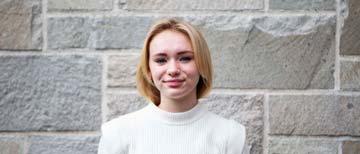
The Resurrection of the Bibliophile

has the time gone in our days? Where did we go wrong? At the risk of sounding like all of our parents when I say this—it’s because we’re on that damn phone all the time.

Today, it’s more Netflix than Neruda. More endlessly scrolling through TikToks than toiling over Tolkien. More posting on Instagram than understanding Ibsen.
“Are you a bibliophile?”
She asked the question like it was an insult.
I was sitting on the chipping blue bench— tucking my obligatory Catholic school plaid skirt under my legs to avoid splinters—with my copy of Harry Potter nestled securely under my arm.
After letting me sit in awkward silence for a moment too long, my middle school teacher was more than happy to condescendingly explain to me something I’d already known: I was the very definition of a book lover.
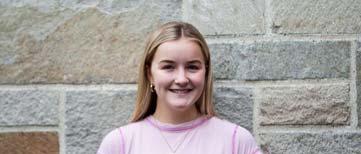
I spent hours tackling Titans with Percy, arching arrows with Katniss, being enchanted by Ella, adventuring through Green Gables with Anne, learning love with the Little Women, and of course, making magic with Harry. I must have read at least four books a week back in middle school, barely reshelving the last one before greedily ripping through the pages of the next. A love like that is supposed to last, right?
So why, then, am I now struggling to average more than four pages a day? And that’s being generous. Like, really generous.
The struggle is not an uncommon one. Friends and acquaintances who I consider to be as book obsessed as me openly lament the fact that the last book they read was always assigned by a teacher and would generally fall in either the category of “boring fiction” or “more boring nonfiction.” Not to knock the greats—you know, Plato or Shakespeare or Steinbeck, but nothing kills the joy of reading a book more than when it’s a line item on your syllabus.
To top it all off, there is simply not enough time in the day to live your own life, let alone to step inside the life of, say, Michelle Obama or Chris McCandless, however empowering or heartbreaking those lives may be. But where
We, as a generation, are among the last to have spent our early childhood playing fairies high up in trees, skinning our knees lying stomach-down on skateboards, and keeping house for a horde of American Girl Doll children. We never had the choice between iPad or outside, so we never needed to worry our pretty little, acne-free heads over fighting the urge to just sit and play Doodle Jump or actually jump on a trampoline.
Now, as a freshly minted adult, I can tell you that the choice between TikTok and Tolkein is a much easier one to make. And let’s just say the end result doesn’t involve Gollum and Gandalf.
The fact of the matter is that picking up a phone is easier than picking up a 200, 300, or 400 plus–page book. You carry your phone everywhere—and who wouldn’t? Your whole life is contained in vibrantly colored little squares just beckoning you to touch them and reap the rewards. Remember when Odysseus stuffed his ears with wax so he wouldn’t be tempted by the Sirens? Yeah, we need something like that so the beeping and buzzing and brightness of our phones doesn’t continually lure us to the dark side of scrolling. I’m sure there’s an app for that.
Every time I’ve picked up a book to try and read recently, I’m embarrassed to admit that my attention span has looked something like a dog in a park after spotting a squirrel: I’m very focused … until I’m not.
How on earth do you start reading again after a six-year dry patch? Unfortunately, the key isn’t a magic Harry Potter spell that forces your focus (but there, again, is another great idea for an app!). The answer isn’t to get rid of your phone, either … I’m no monster. But perhaps there are a few things that we can do to baby-step our way back into the land of the literati.
First, technology was invented to make our lives easier. And let’s face it, you probably have more room in your backpack or your pocket for your phone than you do for something like Les Misérables. If getting back into reading for you means using Kindle, Apple Books, or Libby, so be it. Better yet, invest in Audible and listen to the handsome Jake Gyllenhaal narrate The Great Gatsby, the stunning Reese Witherspoon regale you with her recitation of Go Set a Watchman, or even Matthew McConaughey’s rendition of his own Greenlights. I can’t promise any “Alright, alright, alright,” but I can promise that those voices will make reading sexy again.
Second, start small. No one is saying that you have to be like I was as a kid and walk around with books in each hand. Those 10 pages you read today are better than no pages at all.
Third, read what you want. Just because you’re getting older doesn’t mean you have to read old people’s books. Don’t force yourself to read a boring book just because everyone else was raving about it. Life is too short to read books you don’t like, and the options are endless. Remember, beach reads aren’t just for the beach.
Fourth, hop on Instagram and follow your favorite author. I follow Mary Oliver and she’s been dead for years.
Finally, let’s take back the library. Remember when you used to go to the library to check out a book or two and just … read? So, the next time you’re on your way out of O’Neill after crying your eyes out over calculus or something, stop and ask a librarian what they’re reading. I promise you they have something good. So yes, I’m a recovering bibliophile and proud of it. The reading weather this week has been optimal, so for now I’ll stay cozied up, dutifully committing myself to the pages of a book that has lived the majority of its life thus far collecting dust on my bookshelf. And, hey, maybe by next week I’ll be averaging six pages a day instead of my usual four.
Jazz in the Background
Midterm weeks pitch a wicked curveball to the Spotify algorithm. Unfortunately, when it’s crunch time, “INDUSTRY BABY” simply won’t cut it. Many claim that classical music is the way to go, but it cannot replicate the improvisation of gentle and upbeat instrumentals that jazz captures.
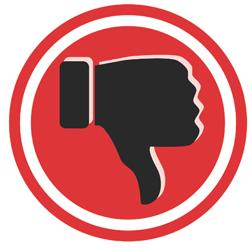


Dressing up for Halloween
Far too often people back out of genius Halloween costume ideas out of fear of others either “not getting the costume” or just plain old embarrassment. Nonsense. Halloween, much like Marathon Monday, is a judgment-free holiday. Take advantage of the fact that middle school is over, and if you want to go around dressed as a wizard and take pictures inside of Bapst, as two legendary students did last year, then do it! Wear a paper bag for all anyone else cares, but wear it with pride. Carpe diem.
It’s Not A Race, It’s a Marathon
Marathon Monday is a Boston College tradition like no other. To be brief, it’s a day that captures the “highlight reel” of all the other BC traditions: think the chaos of a tailgate combined with the school spirit of the Red Bandana Game. Except, is a tradition really a tradition if three quarters of the school is utterly clueless? As a COVID Sophomore, or as I like to say “a freshman in every way that counts except for credits,” Marathon Monday was a learning experience for the books. Below, I’ve compiled a summary of my biggest “learning experiences” from Marathon Monday.
Crossing the Street: Before the days leading up to Marathon Monday, I had probably spent no longer than five minutes considering Boston College’s geographical placement on Commonwealth Ave. After a series of “informative” emails, I came to the realization that my Marathon Monday experience was heavily dependent on crossing Comm. Ave. before it completely shut down for runners. For days, my roommates and I agonized over when we should cross the street. Crossing the
street, I quickly learned, is a balancing act of the utmost importance. Cross too early and you’ll be left bored and sleep-deprived, to aimlessly roam the streets of Gerald and Foster. But, wait too long and fail to cross the street at all, and the “wrong” side of Commonwealth Ave. becomes your personal purgatory. Deciding to err on the side of caution, my roommates and I crossed the street at 6:50 in the morning. Bad idea. The consequence of this anxiety-fueled decision (made by me and a large portion of the sophomore class): mobs of tired, zombie-like people just waiting on the side of the road for something to happen. This spring, I will most definitely be crossing no earlier than 7:30, giving me an additional 40 precious minutes for sleep and bagels.
The Essentials: Communication between BC’s administration and the student body soared to unprecedented levels in the days leading up to the Marathon. But, I would argue that some of the most important details regarding Marathon Monday were omitted, like where to find food and water. Upon reflection, I realize that was probably because there is none. And with that, Kirkwood Rd. becomes the backdrop for the newest season of Survivor as you’re forced to get in touch with your evolutionary hunter-and-gatherer roots. Don’t be like me and substitute a true breakfast for a handful of bagel scraps. Instead, eat a LARGE breakfast and bring your favorite snack with you. One of my roommates, in all of her wisdom, encouraged my entire eight-man to invest in fanny
packs. Her reasoning: not only are they a fabulous costume accessory, but they’re also highly functional and can perfectly store all of the essentials, such as granola bars, a rain poncho, portable charger, and bandaids. Remember, you’re fighting for your life out there. Thanks to the critical thinking of my roommate, my blue metallic fanny pack was Marathon Monday’s most valuable player.
The Social Scene: Two words: sensory overload. Marathon Monday was without a doubt the most socially overwhelmed I’ve ever felt as a BC student. To summarize, there is so much going on, and yet nothing going on, all at once. After spending the better part of an hour haphazardly roaming up and down the street, my friends and I decided we needed a new plan of action. Instead of stressing over where to go or who to see, we abandoned all plans and adopted the slogan “the best plan is no plan.” And almost instantly, my Marathon Monday improved dramatically. Once I wasn’t consumed by the self-inflicted pressure to “have fun,” I got to truly experience Marathon Monday for what it is: a day all about city pride and camaraderie.
The good news for all of us first-time-didn’tknow-what-to-expect marathon spectators out there, we get another Marathon Monday in the spring! Now, with our bonus marathon trial run complete, we can embrace this upcoming mara-

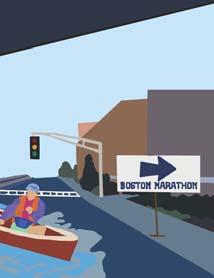
Umbrellas
This is a controversial one, especially given the torrential rains Boston has been subjected to for the last few days. But, umbrellas can be summed up in one word: liabilities. This week, too many students and faculty have fallen victim to the fruitless crusade of attempting to wrestle open their umbrellas while proceeding to get just as soaked as if they had just borne the storm. Once an umbrella does enter a mode of semi-usefulness, many betray their owners by flipping inside out and threatening to recreate Disney’s Soarin’.
Laundry
If the process of washing and drying one’s clothes at Boston College was a litmus test for human nature, Jean-Jacques Rousseau would be appalled. Somehow the rigid schedules and punctuality that most BC students worship dissipate upon entering the laundry room. Clothes are left in washers and dryers for hours if not whole days, filling up limited spots and developing interesting smells. At this point, it would probably be faster to drag a laundry basket to the Res, throw a tide pod in, and hope the geese don’t steal your clothes.
O
A8 MONDAY, NOVEMBER 1, 2021 THE HEIGHTS
PINIONS
TABITHA PARENT
CAMERON WALKER
Tabitha Parent is an op-ed columnist for The Heights. She can be reached at tabitha.parent@bc.edu.
GRAPHIC BY OLIVIA CHARBONNEAU AND ANNIE CORRIGAN / HEIGHTS EDITORS
Cameron Walker is an op-ed columnist for The Heights. She can be reached at cameron.walker@bc.edu.











 BY JACK BERGAMINI For The Heights
BY JACK BERGAMINI For The Heights







 BY EMMA HEALY Sports Editor
BY EMMA HEALY Sports Editor










 BY CAROLINE QUINN Heights Staff
BY CAROLINE QUINN Heights Staff


 BY SIOBHAN PENDER For The Heights
BY SIOBHAN PENDER For The Heights











